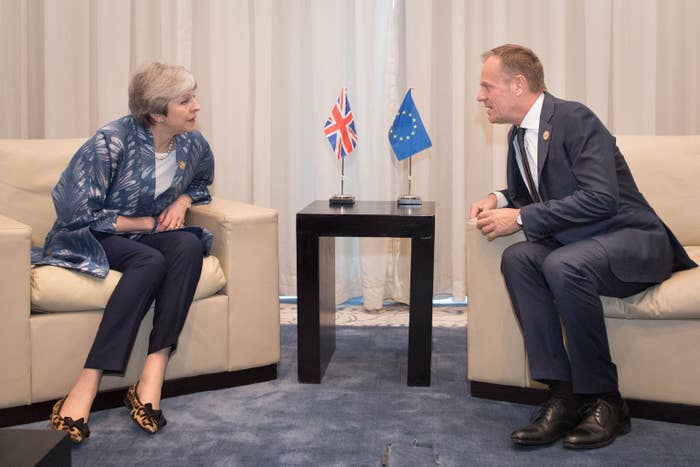
Theresa May told the president of the European Council, Donald Tusk, in Sharm El Sheikh last weekend that she might need to delay Brexit to implement necessary legislation even if MPs back the withdrawal agreement later this month, according to a diplomatic note seen by BuzzFeed News.
The note is of a briefing made to the ambassadors of the EU’s remaining 27 member states on Friday morning. It reveals that May told Tusk on Sunday that she would need extra time in the form of a “short and technical extension” to implement legislation if MPs back her deal in a meaningful vote she has promised will take place by March 12.
This is the first time the prime minister has acknowledged that Brexit may have to be delayed beyond March 29, even if her deal wins the support of the House of Commons. It suggests the only scenario in which Britain will leave the EU later this month is with no deal.
On Tuesday, she told MPs that if they reject the withdrawal agreement, they will get a vote the following day on whether to leave on March 29 with no deal. If, as expected, they reject that option too, they will then get a vote on whether to delay Brexit.
Up until the point members of her cabinet and MPs forced her to offer that amendment opening the door to a possible delay, the prime minister had repeatedly insisted that the UK would be able to leave on March 29 as planned.
It is understood that May also told Tusk during their meeting in Egypt that her ambition is to leave on the 29th.
A Downing Street spokesperson said: "As the PM made clear to President Tusk, we are absolutely focused on getting the Brexit deal over the line and passing the necessary legislation so that we leave the EU on 29 March. That is within our grasp as we approach the meaningful vote."
The EU’s assessment is that May will need substantial support from Labour MPs if she is to win the meaningful vote. Even then, her chances of success were described to the diplomats as “slim”, the note says.
The 27 diplomats were told that the EU was willing to provide more statements of support to the political declaration that outlines the future UK-EU relationship. However, the note adds: “Efforts by [the] UK to find alternatives to [the] backstop are fading away.”
The ambassadors were also told that the key focus for the 27 leaders will now be on prolonging Article 50, and the length of any potential extension.
Any extension, including its length, would need to be discussed and signed off by the leaders at this month’s European Council, alongside agreement with the UK, and would need to be justified by a clear reason to extend the Article 50 process, the note states.
EU sources told BuzzFeed News that the first step to extending Article 50 would be a formal request from the UK. The European Commission would then make its recommendations to the 27 leaders, who would then come to a decision at a European Council.
In recent weeks UK and EU officials have been working to find ways to provide MPs in the UK with additional assurances that the backstop — the insurance policy in the withdrawal agreement negotiated by the UK and the EU that guarantees that there can be no hard border under all circumstances — will not be indefinite.
May is under intense pressure to find a new path forward after MPs voted in favour of the Brady amendment in January, which rejected the terms of the current backstop, and is seeking a legally binding alternative. This, the UK says, could include a unilateral exit mechanism, the introduction of a clause to time limit the backstop, or ways to replace the backstop with as yet undefined “alternative arrangements” that avoid a hard border between the Republic of Ireland and Northern Ireland.
But EU leaders have remained adamant that the withdrawal agreement cannot be reopened, and that the backstop is needed “unless and until” other workable solutions that achieve the same purpose are in place. The bloc has offered to provide further assurances and clarifications as well as explore what role alternative arrangements to the backstop could play in future.
